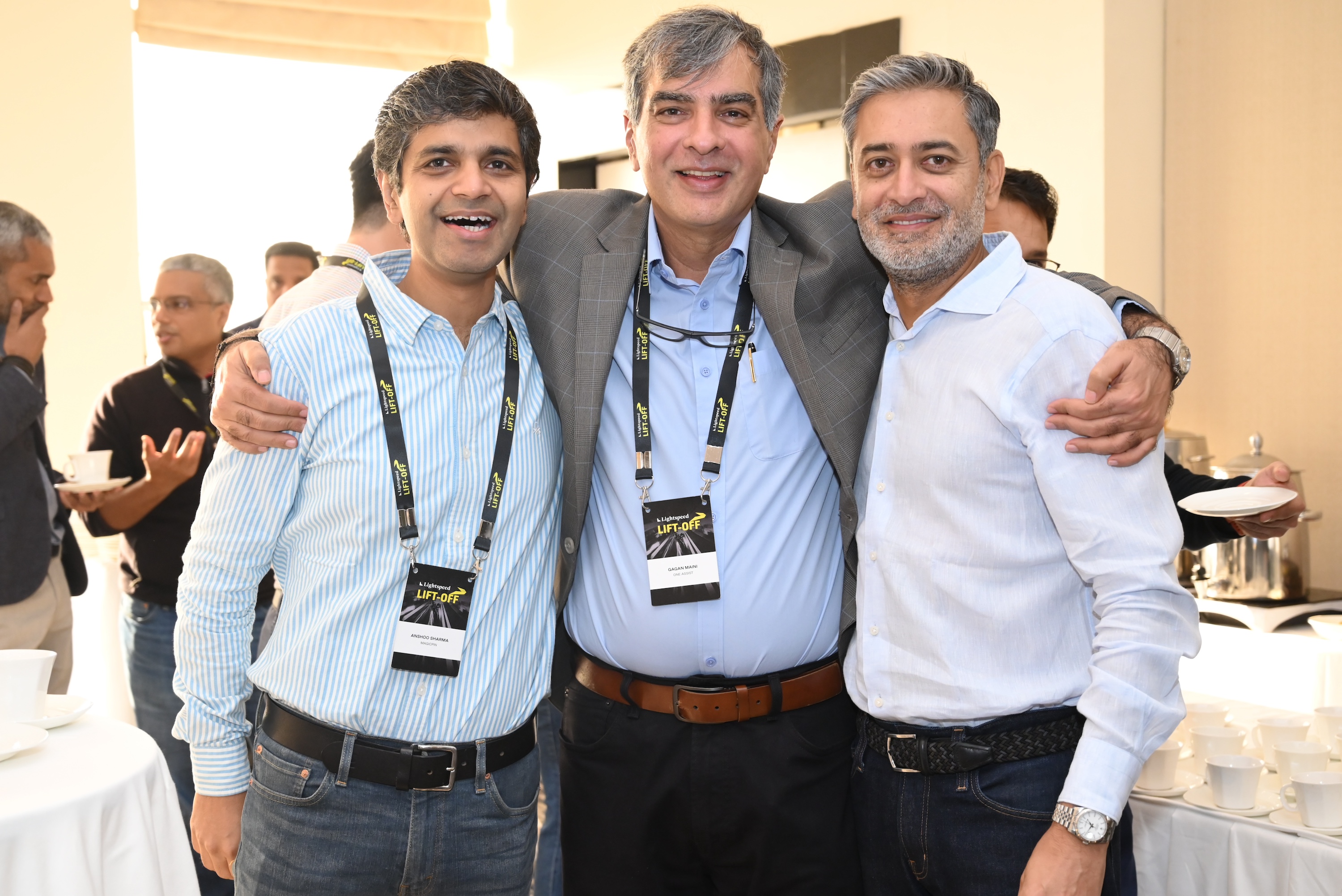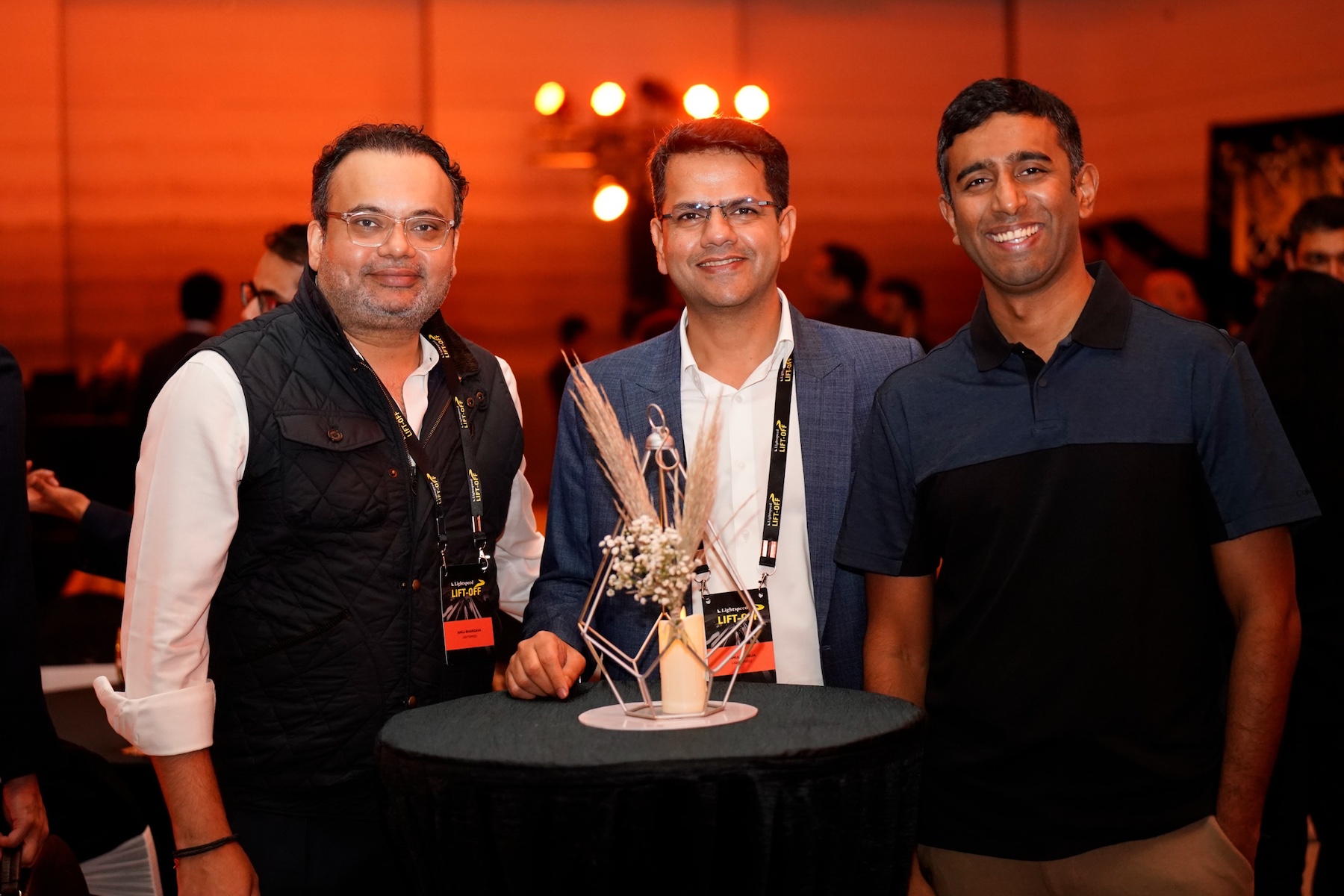Over 150 investors, including Singapore’s sovereign fund Temasek and Malaysia’s Khazanah, gathered at Mumbai’s five-star Trident Oberoi hotel on a recent Friday for venture firm Lightspeed India Partners’ “Lift Off” summit.
The two-day event aims to spark partnerships by enabling “in a short window, many views, ideas and investments to be shared between nC2 connections (every permutation and combination),” described Karthik Reddy, co-founder of Blume Ventures.
The event builds on the success of last year’s inaugural Lift Off, which helped spur deals and networking, including paving the way for Singapore sovereign fund GIC’s investment in business-to-business marketplace Vegrow later in the year.
The upbeat atmosphere this year reflected India’s rebound in startup funding over the past three to four months. But the lavish setting couldn’t mask pressing questions still facing the industry.
Byju’s, once India’s most valuable startup at a $22 billion valuation, is seeking new capital through a rights issue that would slash its valuation by a whopping 99%. Paytm, once the poster child of India’s startup dreams that went public at a $20 billion valuation in 2021, has seen its market cap shrivel below $3 billion amid the tech market carnage and regulatory upset.
Many late-stage startups remain wedded to their peak 2021 valuations. And many highly valued 2021 seed deals are floundering without follow-on funding. At the same time, Indian VCs are currently sitting on a record $20 billion in dry powder, raising skepticism among many investors about excess fundraising.
On VC fund size
“Sitting here in early 2024, with the benefit of observing 2023 investment activity levels as well as the pace of startup creation, I think the answer is yes,” responded Lightspeed partner Bejul Somaia when asked whether Indian VC firms have over-raised, amassing more funds than they can responsibly deploy.
“The current vintage of funds were raised in 2021/2022, when activity levels and investment dollars were substantially higher than 2023. In 2021, $33 billion of venture capital (early and late stage) was invested in India. In 2023, this number was $9 billion. So we have to keep in mind that funds raised in 2021/2022 were sized for an opportunity that was reflective of that time,” he explained.
“If you look at the number of investments, the number was 2,200 in 2021 and approximately half of that in 2023. Now, that doesn’t mean the market will not accelerate again in two to three years . . . market cycles do happen. So 2023 is also not necessarily reflective of the venture market opportunity in India,” he added.
Lightspeed Venture Partners India — which had returned over $1 billion to LPs by mid-year in 2023 — was unusually restrained during 2021’s period of hyper-exuberance when deals closed in days with inflated valuations and unreasonable founder-friendly terms — a frenzy Somaia hopes the market never revisits.
“Environments like 2021 make me quite anxious. Investment opportunities move fast and at high prices . . . and growth, hype and salesmanship start mattering more than building durable companies. Even as our mark-to-market performance was looking incredible, that’s perhaps one of the few years at Lightspeed when I had the most anxiety. On one hand, these valuations were market-determined; on the other they didn’t jive with our assessment of the business,” he said.
“So how do you know who is right? Does the market know something we don’t? Fortunately we stayed with our convictions for the most part through that time.”

Over the past three years, many India-focused venture capital firms have raised substantial new funds that dwarf their previous vehicles — Peak XV has amassed $2.5 billion for the region across recent closes, while Nexus Venture Partners pulled in $700 million, Elevation raised $670 million, and Accel garnered $650 million. Lightspeed, which began investing in India more than 15 years ago, and later formed dedicated funds for the country, unveiled a $500 million fund, its fourth for India, in 2022.
“With respect to Lightspeed India’s most recent fund, I believe that is sized at the lower end of our peers. This sizing is a deliberate choice,” said Somaia. “That said, maybe our peers see an opportunity that we don’t, or have a more expansive investment strategy — and we are always curious to learn. But we want to guard against the risk of too much capital resulting in strategy drift.”
Somaia said he anticipates many firms, including Lightspeed, to take three to four years to deploy their funds instead of the typical cycle of two and a half years to three. “We need to deliver top-tier returns to our LPs, who have become accustomed to a certain kind of return from a firm like Lightspeed. We will never compromise that to put money to work,” he said.
India in the global AI race
With AI progress surging in Western hubs, India is lagging in foundational research as very few of its startups attempt to build large language models.
Lightspeed sees parallels to the firm’s early investment in Indian Energy Exchange — building a power trading platform whose analog didn’t exist in Western markets. “My perspective is that right now we are at a phase with AI where a lot of the infrastructure, and some tooling, is being built. This is primarily happening in Silicon Valley. It has actually been a reminder that the concentration of technical talent in Silicon Valley is unparalleled,” said Somaia.
“In the time that we have been investing in India, we have observed limited core technical infrastructure innovation. Most of the opportunity tends to be at the application layer — for consumer and enterprise. There are many reasons for this, including market dynamics and the investor community, where we have few technically-strong investors . . . so it’s a bit of chicken and egg,” he added.
Hemant Mohapatra, a partner at Lightspeed, focuses on deep tech and has backed startups like Rephrase, one of the earliest generative AI startups, and large language model AI startup Sarvam.
Mohapatra agreed that access to top-tier AI talent is constrained globally. But similar to the cloud computing shakeout, he predicted consolidation around a few AI technology and business paradigms once current hype subsides. Given India’s engineering bench strength, targeted AI opportunities could still emerge locally even if Silicon Valley retains its general innovator dominance, he said.
The patient capital

A concern held by many investors in India is that several late-stage startups continue pushing for up-rounds, exhausting their runways before accepting post-downturn realities.
Anuj Bhargava, Lightspeed MD and head of India Corporate Development, told TechCrunch he sees progress toward alignment with the public markets. “I think this is the year where the financing that will happen will be in more sync with the public markets. For growth companies, the private markets have been slow. But for the names that have really improved their PnLs, have cut the burns and are on sustainable unit economics, I think the public markets offer a great opportunity,” he said.
India has also attracted growing sovereign fund interest over the past three years at a scale it never has before, he said, adding he was optimistic that they will invest in many late-stage startups. “We had a lot of funds not based in India but investing in India because of the opportunity the country offered to them outside their own. A lot of companies ended up raising money that didn’t justify their scale or progress. In the last few years, some of the momentum investors have has not been invested as much in India, creating a void,” he said.
“That void has been filled by patient capital — sovereign funds were very quiet in 2020 and 2021; pension funds [that] were either quiet and probably hadn’t invested much in India earlier; and the growth arms of the private equity funds, many of which earlier weren’t investing much in tech. So these three pockets of capital are mature, long-term and patient and I anticipate we will see more activities from them going forward.”
While late-stage funding remains tightened considerably, some investors see bright spots in India’s early-stage ecosystem. Peak XV, Lightspeed, Elevation, Accel and Nexus signed over a dozen early-stage deals in the month of January alone, according to a person familiar with the matter.
“While many in the ecosystem are busy guessing when winter will be over, we however believe there is no time like now to build (and for us to invest),” said Lightspeed partner Rahul Taneja.
The skilled talent and eager capital remain accessible at early stages, he said. “Founder quality is much better — the folks who are leaving their jobs truly believe in their ideas, and are willing to take the plunge in what most would call a ‘slow year.’ Access to high-quality talent is much better, and capital allocators have been waiting to make bolder bets. Every single day, we get to meet exceptional founders at the earliest stages of venture creation — and realize how lucky we are to be in a position to support India and Southeast Asia’s digital growth.”






























Comment